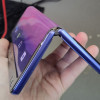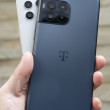Hands-On: Meizu MX3
Jan 5, 2014, 11:41 PM by Eric M. Zeman

Meizu promised to deliver its first smartphone to the U.S. market later this year. The company had the MX3 on hand, which is likely to be the phone it sells here. We took a quick look.
Meizu MX3
Meizu is relatively unknown to those of us in North America. It's a Chinese phone maker that hopes to make it big in the U.S. market in the coming years. Its first foray into the U.S. water will be with the MX3, an Android smartphone that's been available in China since last year, but is being shown off at CES for the first time. Here are our initial impressions.
The MX3 is very simplistic as far as the design goes. It has a plain plastic shell forming the back and a glass front forming the display. There are hardly any design elements, it is a slab with few frills. The white plastic back meets the black front in a clean, straight seam. The MX3 is thin and light - almost too light. It feels as though there's hardly anything inside the phone. The plastic is a bit more cheap feeling than I'd like it to be, but Meizu assured me the phone is far from its final, manufactured form. The construction is certainly tight.
The slim form is quite easy to hold. The edges are tapered nicely and the MX3 will slip into most any pocket. The are no physical buttons on the front, the glass is clean and free of buttons. There are capacitive controls below the display. The volume toggle is along the left edge of the device. It stands out nicely and had excellent travel and feedback. The screen lock button has a similar feel, and is positioned along the top of the phone. The stereo headphone jack is next to it. There are no buttons along the right, and the microUSB port is on the bottom.
One novel feature. The MX3 looks and feels like a sealed, unibody device. Believe it or not, however, the rear cover comes off with the use of a paperclip. It pops off in order to provide access to the SIM card and microSD card ports. Meizu offers several different colors so users can make the MX3 more their own.
The MX3 has a 5.1-inch 1080p HD display. It looks good, but not great. I was impressed with the resolution, but not the colors, which looked a bit flat. Everything on the screen was clean and sharp, though.
The hardware is one side of the story and the software is the other. Meizu did some interesting things to make the device stand out from the crowded field of Android flagships. For starters, it is easy to wake the phone from sleep by sliding your thumb from the home button upward. The area to the left of the home button is used to bring up a multitasking toolbar that runs across the bottom of the screen. Meizu has done away with the standard app drawer entirely. Instead, all the apps are on the home screen panels. This cuts down on the amount of digging you have to do to find your stuff. At the same time, Meizu created a novel way to arrange the home screens, which makes it easy to drag app shortcuts from one screen to another.
Meizu added a drag-and-hold gesture to help users reach UI elements near the top of the screen without repositioning their hand. For example, pull down on the home screen slightly, and it will stay so you can tap the search bar, which is now 1cm lower on the screen. Meizu also made it easy to select multiple items at once. Rather than tap check boxes, you can swipe your finger down a list to select all the items. Its pretty neat.
Meizu said the MX3 will be available in the U.S. later this year, but said that it has some work to do to finalize the device. More details should be available later this week.
Comments
No messages











 TCL's New Foldable Concept Swings Both Ways
TCL's New Foldable Concept Swings Both Ways
 Hands On with Xplora Kids Smartwatches
Hands On with Xplora Kids Smartwatches
 Hands On with the 2023 moto g 5G & moto g stylus
Hands On with the 2023 moto g 5G & moto g stylus
 Nokia Brings New Affordable Phones to T-Mobile, Boost
Nokia Brings New Affordable Phones to T-Mobile, Boost
 Cricket Doubles Down on White-Label Phones
Cricket Doubles Down on White-Label Phones


